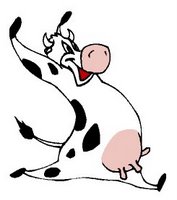 Poking around the news websites today, I found two stories seemingingly unconnected that got my attention.
Poking around the news websites today, I found two stories seemingingly unconnected that got my attention.The first was about how the publishing of children's books in the U.S. has been sanitized with political correctness.
The second story was about how a child lost his mother forever because a 911 operator wouldn't take him seriously. Six-year-old Robert Turner did what he was taught when his mother, who suffered from an enlarged heart, passed out. He dialed 911 and told the operator. She told him to put an adult on the phone. Three hours later he called again, and was told to stop playing on the phone. His mother died before police arrived.
The message? Children don't count. Children aren't to be trusted. Children are stupid.
Why? Could it be because we try to force them to live in a make-believe world? Not the make-believe world of cartoons and video games, but the make-believe world of political correctness? You know the world, the one where cows don't have udders and there is no such thing as an elderly person with a walking cane. There is a reason for stereotypes — they're usually true. Not a matter of judgement, or prejudice, but a matter of fact.
Should political correctness be used to create a better society? Is it wise, or is it foolish? Are we inspiring our children by painting pictures suggesting life is "better" than it is, or are we harming them with lies? I don't know the answer. Neither did the 911 operator who wouldn't believe little Robert Turner.
"It's not only gone mad, I think it's completely irrational," says illustrator Roland Harvey.
What's verbotten in children's books today, according to U.S. publishers?
- Udders on cows
- Large lips on dark-sknned children
- "Asian-looking" eyes
- Avoid stereotypes such as females as peripheral/helpers to active/leading males, or senior citizens as infirm, with canes, doddering.
- Elderly people should be shown as active members of society; unless relevant to text they should not be shown in wheelchairs.
- Show mothers involved in outside employment (not in aprons in kitchens). Show African-Americans in positions of power, not just in service industries.
- Show African-Americans and other people of colour with a range of skin tones. Hair texture should vary from straight to curly.
- Do not stereotype Asian people with glasses, bowl-shaped haircuts, or as intellectuals.
- No large groups of people without an appropriate ethnic mix and male/female ratio.
- No "help the disabled" pictures — show disabled people doing for themselves and others.
- Show many types of family grouping. Take care not to imply that one-parent homes are broken.
- A high school in Michigan has forbidden a student-led "Traditional Values" club from flying their flag alongside all the other school club's flags, because their flag bears a small-letter "t" as its symbol. The school says the T might be misinterpretted as a Christian cross.
- The president of Hobart and William Smith Colleges in upstate New York, Mark Gearan, is complaining about his school's sports fans mocking the rival Syracuse Orangemen with tee shirts that read, "At least our mascot isn't a fruit," according to the Finger Lakes Gazette. Gearan said use of the term might be misinterpreted as a derogatory reference to gays, making its use "especially painful to many because of our commitment to diversity, equity and social justice."
Political Correctness | Children | Children's Books | Publishing
No comments:
Post a Comment
Note: Only a member of this blog may post a comment.